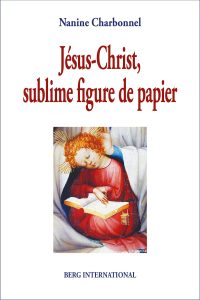This post is detailed. But it is getting down to the nitty gritty of a case for the midrashic creation of the Jesus figure in the gospels.

Nanine Charbonnel cites four intriguing instances.
A. I Am/I Am He/I and He … and we are all together
Many of us are familiar with Jesus declaring “I am” (ἐγώ εἰμι) which echoes Yahweh’s self-declaration in the Pentateuch; less familiar are the moments when Jesus says, “I am he” (ἐγώ εἰμι αὐτός – e.g. Luke 24:39), and that sentence echoes the second part of Isaiah (אֲנִי-הוּא = hū ’ănî = I [am] he; LXX = ἐγώ εἰμι = I am) and liturgies of the Jewish people. (I’ll simplify the Hebrew transliteration in this post to “ani hu” (= I he).
These self-identifications bring us back to Exodus 3:14 where God reveals himself to Moses at the burning bush: “I am he who is”, which in the Greek Septuagint is ἐγώ εἰμι ὁ ὤν.
But we need to look again at those words [hu ani] in Deutero-Isaiah:
In Isaiah 41:4; 43:10, 13; 46:4; 48:12; 52:6 we read God declaring, I am he [ani hu] (=me him) אֲנִ֣י ה֔וּא
We will see that this expression, “I he” is related to the festival of Tabernacles or Sukkoth.
But first, we note that during New Testament times at the Feast of Tabernacles or Tents worshippers walked around the altar each day singing “O Yahweh save us now, O Yahweh make us prosper now”, which is a line from Psalm 118:25
| נָּא | הַצְלִיחָה | יְהוָה | אָנָּא | נָּא | הוֹשִׁיעָה | יְהוָה, | אָנָּא |
| na | hatzlichah | yhwh | ana | na | hoshiah | yhwh | ana |
| now | prosper us | [we pray / beseech you] | now | save us | [we pray / beseech you] |
Now in rabbinic literature, in Mishnah Sukkah 4:5, we find another version of this liturgical sentence was said to be used during the temple ceremony.
Each day they would circle the altar one time and say: “Lord, please save us. Lord, please grant us success” (Psalms 118:25). Rabbi Yehuda says that they would say: Ani waho, please save us. And on that day, the seventh day of Sukkot, they would circle the altar seven times.
| הוֹשִׁיעָה | וָהוֹ | אֲנִי |
| hoshiah | waho | ani |
| save us | [taken to be a substitute for the divine name by some scholars – see Baumgarten below] | I (Hebrew); (confusingly, ana in Aramaic means “I”. By hearing the original Hebrew ana as the Aramaic ana, the transformation to Hebrew “I” follows.) |
Both ani and waho may be considered “flexible” as I’ll try to explain.
- ani in Hebrew means “I”
- ana in Hebrew means something like “we pray” as above
Aramaic was the relevant common language in New Testament times, however, and it’s here where the fun starts.
- ana in Aramaic means “I”
So we can see how the Hebrew “we pray” can become the Aramaic “I”.
If waho, והו, began as a substitute for the divine name it could when pronounced easily become והוא, wahoû, which is the Aramaic for “me”.
NC writes,
qui peut être une manière de dire ‘ani wahoû’, “moi et lui”.
Translated: which can be a way of saying …. “me and him”. (The “wa” = “and”.)
Not cited by NC but in support of NC here, Joseph Baumgarten in an article for The Jewish Quarterly Review writes,
Mishnah Sukkah 4.5 preserves a vivid description of the willow ceremonies in the Temple during the Sukkot festival. Branches of willows were placed around the altar, the shofar was sounded, and a festive circuit was made every day around the altar. The liturgical refrain accompanying the procession is variously described. One version has it as consisting of the prayer found in Ps 118:25, אנא ה׳ הושיעה נא, אנא ה׳ הצליחה נא , “We beseech you, O Lord, save us! We beseech you, O Lord, prosper us.” A tradition in the name of R. Judah, however, records the opening words as follows: אני והו הושיעה נא. The meaning of this enigmatic formula has occasioned much discussion among both ancient and modern commentators.
In the Palestinian Talmud the first two words in the formula were read אני והוא and were taken to suggest that the salvation of Israel was also the salvation of God.
(Baumgarten, Divine Name and M. Sukkah 4:5 p.1. My highlighting)
The same idea is brought out by NC in her quotation of Jean Massonnet. I translate the key point concerning the “I and he” or “me and him”
This may be a way of closely associating the people with their God on an occasion when the Israelites might surround the altar; it was a great moment of the feast […] In a veiled form, one audaciously asked for salvation for the good of the people and of God, as if God – so to speak – was in distress with his people.
(Massonnet, Aux sources du christianisme…., p. 269, cited by NC, p. 317. My highlighting.)
NC adds, again translating,
we are the emphasing the last sentence. He adds: “the idea that God accompanies his people in distress is […] ancient and widespread”, see Isaiah 63, 9: “in all their distress it is distress for him”. On personal pronouns see Pierre Bonnard, L’Évangile according to Saint Matthew, p. 64, note.
Finally, one point I failed to mention earlier, recall our earlier discussions of the importance of gematria. In that context it is not insignificant that “ana YHWH” has the same numerical value as “ani waho”.
B. Dabar, a Word in Silence Continue reading “4 Jewish Word Plays behind the Word Becoming Flesh / 3 … (Charbonnel: Jésus-Christ, Sublime Figure de Papier)”
